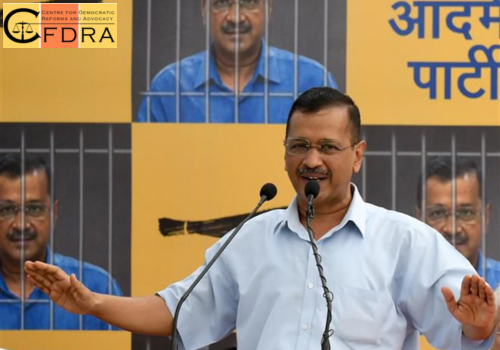Supreme Court to Deliver Critical Ruling in Arvind Kejriwal’s Bail Plea Against Delhi High Court’s Stay in Excise Policy Case

The Supreme Court is currently hearing a crucial appeal filed by Delhi Chief Minister and Aam Aadmi Party (AAP) leader Arvind Kejriwal challenging the Delhi High Court’s interim order staying the bail granted to him by a trial court in the Delhi excise policy case. A bench comprising Justices Manoj Misra and SVN Bhatti is hearing the matter, with the Enforcement Directorate (ED) opposing Kejriwal’s plea to set aside the High Court’s stay order.
Kejriwal was arrested on March 21, 2023, in a money laundering case linked to the now-scrapped Delhi excise policy of 2021-22. The ED alleged that the AAP had conspired to deliberately leave loopholes in the policy for the benefit of certain liquor sellers, and that the party used kickbacks received from this arrangement to fund its elections in Goa.
In response, Kejriwal has maintained that the ED has no proof to back up its allegations and that it is running an extortion racket. He was briefly released from jail on interim bail following a May 10 order by the Supreme Court so that he could campaign for the now-concluded Lok Sabha elections. However, he returned to jail on June 2 after an interim bail plea filed on medical grounds was rejected by a trial court on June 5.
In a recent turn of events, Judge Niyay Bindu of the Rouse Avenue courts granted Kejriwal regular bail on June 20, only for the Delhi High Court to stay this decision the next day after the ED challenged the trial court’s order. The High Court reserved orders on June 21 and informed that it would pronounce its verdict in a couple of days. In the meantime, the trial court order was stayed.
Kejriwal has now moved the Supreme Court to challenge the High Court’s stay order, arguing that his right to liberty is being unjustly restricted. Additional Solicitor General (ASG) SV Raju, representing the ED, told the Supreme Court that the High Court is seized of the matter and will pass orders.
Senior Advocate Dr AM Singhvi, representing Kejriwal, countered that bail granted and bail reversal are two different things. He argued that the procedure for staying bail on the first day is unprecedented and that the balance of convenience is in his favor. If Kejriwal’s plea is rejected, he will be sent back to jail and will be in the same situation as he was three weeks ago when he surrendered under Supreme Court orders.
The Supreme Court’s decision in this case is crucial as it will impact not only Kejriwal’s personal liberty but also the political landscape of Delhi. The AAP has been critical of the ED’s investigation into its dealings in connection with the excise policy, accusing it of being politically motivated. The party has also claimed that Kejriwal’s arrest was aimed at weakening him ahead of upcoming elections.
The ED, on the other hand, has maintained that its investigation is based on solid evidence and that Kejriwal’s actions have compromised national security and national interest. The agency has also accused Kejriwal of using his position as Chief Minister to influence decisions made by officials and government agencies.
As the Supreme Court hears Kejriwal’s appeal against the High Court’s stay order, both sides will present their arguments and evidence to establish their claims. The outcome of this case will have far-reaching implications for Indian politics and governance, and will be closely watched by political observers and citizens alike.


